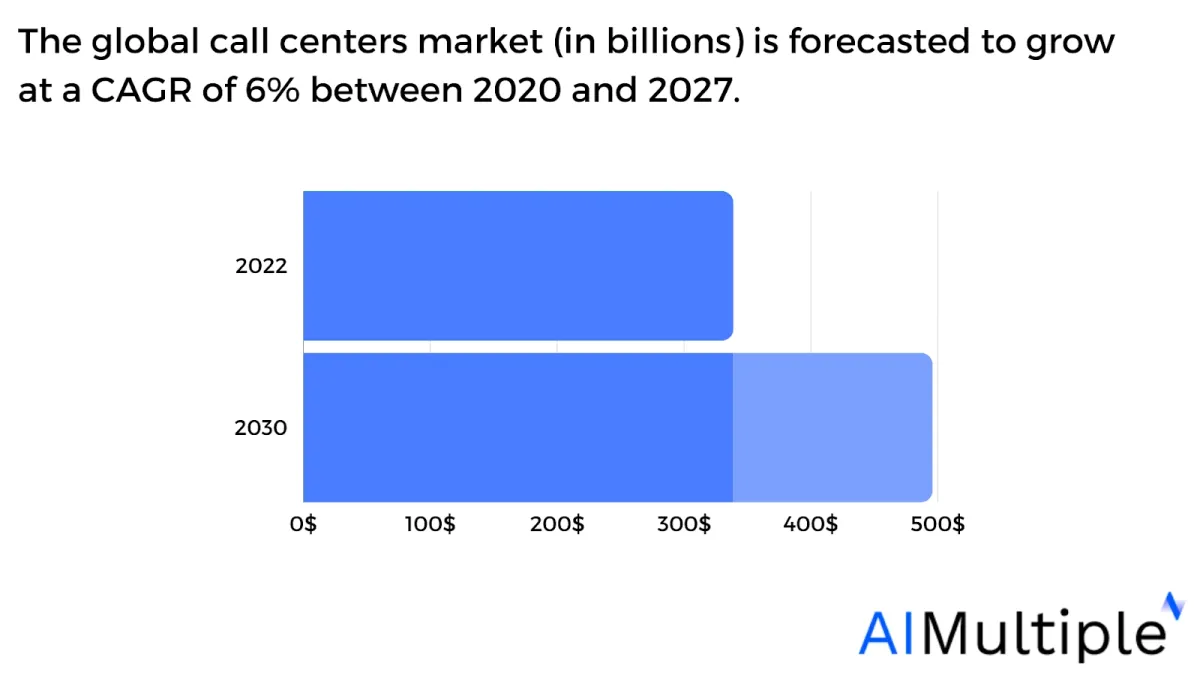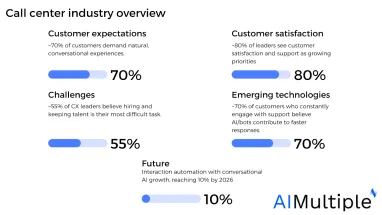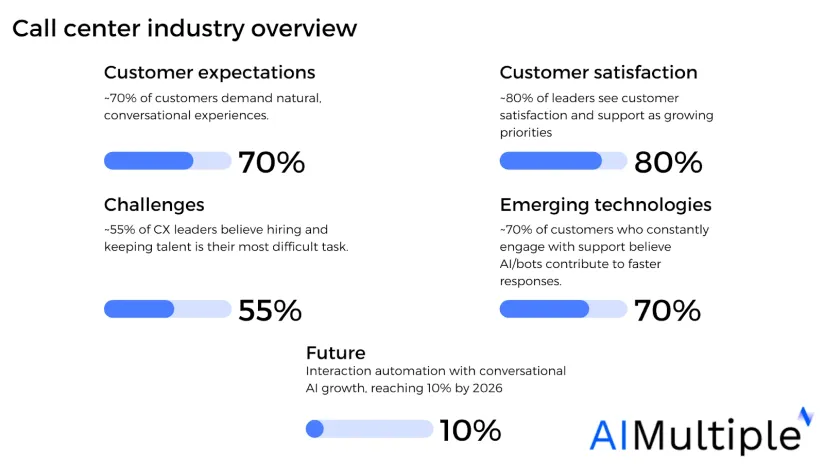Companies can use these call center stats and insights to improve their service strategy to better meet customer expectations.
We structured these insights into relevant themes and highlighted 40+ up-to-date call center metrics sourced from expert analysis and industry research:
1- The state of the call center market & forecasts
1. The global market for call centers, valued at ~$340 billion in 2020, is expected to rise to ~$500 billion by 2027.1

Source: Statista2
2. The U.S. had the most number of call centers in 2022.3
2- Call center customer expectations
3. ~70% of customers prefer organizations to provide customized experiences, and ~75% are upset when this does not occur.4
4. ~85% of customers expect to reach out to a customer service team instantly when they call a company.5
5. ~60% of the customers prefer to call the company via phone to complete a transaction.6
6. ~55% of surveyed customers say interacting with a live agent delivers the quickest solution, and ~75% believe that first-contact resolution is the most important factor in improving customer experience.7
7. ~70% of customers demand natural, conversational experiences.8
8. ~40% of customers expect call agents to know who they are and the context of their inquiry right away.9
9. 65% of customers prefer to solve their issues from a self-service portal.10
10. ~30% of millennials prefer to use the phone channel to contact brands in the U.S. The same was true for ~30% of Generation Z.11
3- Emerging technologies in call centers
11. 55% of leading companies view technology as an enabler—rather than a replacement—for live or in-person interactions.12
12. 25% of respondents in the U.S. say they are thrilled to connect with an AI service when calling a business, however, ~45% stated they are not thrilled to do so.13
13. ~70% of customers who constantly engage with support believe AI or chatbots contribute to faster responses.14
14. 65% of leaders believe their AI or chatbots are evolving into more natural and human-like.15
15. ~55% of companies implement digital phone transcription to increase productivity.16
16. More than three-quarters (77%) of leaders state that they will dramatically change their technology and customer interaction approach.17
4- Call center customer satisfaction
17. ~70% of customers will be more loyal to a brand that provides a personalized experience.18
18. ~70% of those who use customer service bots regularly report noticeable enhancements in quality, and dissatisfaction levels continue to fall.19
19. ~80% of respondents state that they have recommended a company based on top-notch customer service.20
20. ~45% of customers report feeling annoyed or upset when they are kept in the queue for 5-15 minutes.21
21. The average call center customer satisfaction percentage for financial services is ~80%.22
22. ~95% of the customers say a positive customer service experience makes them more likely to purchase again.23
23. 80% of polled respondents indicate that using chatbots increased their dissatisfaction, and ~70% said they were a waste of time.24
24. ~75% of business leaders realize that deeper customization contributes to increased customer retention (and ~60% feel it decreases acquisition costs).25
25. Compared to shopping online, 85% of respondents said chatting to a person on the phone to address concerns made them feel more confident when making purchases.26
26. The average customer satisfaction rating in the U.S. is ~75%.27
27. ~80% of these leaders see customer satisfaction and customer feedback management as growing priorities.28
5- Call center challenges
28. Call center and contact center customer service teams are included in the 12 high-turnover jobs in 2021.29
29. The average agent turnover period in call centers is 15 months in sales roles and 13.7 months in support roles.30
30. ~30% of customer service agents and supervisors are currently seeking a new career, with only 60% looking for another call center role.31
31. ~55% of CX leaders believe hiring and keeping talent is their most difficult task.32
32. ~60% of agents believe they get no value out of the training provided by their call centers or contact centers.33
7- Call center performance metrics
33. ~2 minutes is the time for a caller to quit the call that was placed on hold.34
34. The average hold time for a call is ~3 minutes.35
35. Callers spend ~4 minutes on average on the phone waiting to contact an agent.36
36. The average incoming call abandon rate of global call centers is ~6%.37
37. The average talk time for a customer is ~3 minutes.38
38. ~80% of the callers are rerouted at least once.39
39. A typical caller gets routed ~2 times before the issue gets resolved.40
40. The average number of customer calls answered per day is 200.41
8- Future of call centers
41. 50% of companies are likely to invest in technologies that shorten customer service response time and improve their call center performance.42
42. One-third of leaders say that developing next-generation digital platforms to enable customer-facing teams to perform more effectively is a top digital investment objective.43
43. Gartner predicts a five times growth in interaction automation with conversational AI, reaching 10% by 2026, a significant increase from the 1.8% noticed in 2022.44
44. It is predicted that there will be ~8 billion voice assistants in use globally, which is twice the number of voice assistants in use in 2020.45
Top 7 customer service trends
1- Customer demand personalized experiences
The trend of increasing customer expectations for personalized experiences speaks to the demand for services and interactions that are tailored to individual customer needs and preferences.
- Customers today expect companies to put their needs and interests at the forefront. They want to feel valued and understood by the brands they interact with.
- For example, e-Commerce platforms such as Amazon and Alibaba use browsing and purchase data to offer personalized products and personalize homepage content, promotions, and notifications.
2- Automation in customer service operations is higher than ever
Automation in customer service refers to using technologies to streamline and enhance customer interactions and reduce manual tasks for the customer service team.
For example, Zendesk and Salesforce offer automation for ticket categorization, classifying and prioritizing customer issues, and routing them to the appropriate team. Some automation technologies in customer service include:
- Customer service software
- Help desk software
- Cloud contact center solutions
- Contact center AI
- Social customer service
- Process automation
- Chatbots and virtual assistants
3- Customers expect more self service options
Self service options allow customers to resolve their issues or find the information they need without having to reach out to customer service agents. This includes actions like:
- Checking account balances
- Making changes to orders
- Updating account details
- Finding answers to common questions in FAQs
- Troubleshooting problems using guides or tutorials
Self service tools are a preference for customers as they often provide immediate solutions without the wait times associated with traditional customer service channels.
To learn how to implement self-service successfully, check our article on the customer self service tool selection guide.
4- Chatbots are becoming popular
Chatbots are designed to interact with humans in their natural languages. These interactions typically occur through messaging platforms, websites, or mobile apps.
Unlike a customer support team, chatbots can function 24/7 and provide immediate responses, which is highly advantageous when customers expect quick, anytime assistance.
Moreover, messaging channels align with the current usage trends. People are spending more time on messaging apps, like WhatsApp, Facebook Messenger, or Slack, for personal communication and interacting with businesses.
5- Customers expect to communicate through social media
Social customer service is an indispensable asset for businesses. Customers spend a significant amount of time on social media platforms such as Facebook, X, Instagram, and others. As such, it’s convenient and natural for them to reach out to businesses through these same platforms for support or inquiries.
Social media makes customer service interactions public. This visibility puts pressure on companies to respond effectively and promptly, as their handling of issues can impact their brand image and customer loyalty.
For more on the customer feedback tools that help companies analyze customer data, here is our vendor selection guide.
6- Service teams are switching to remote work
Modern customer service tools are often cloud-based, meaning they can be accessed from anywhere with an internet connection. This includes:
- Customer relationship management (CRM) systems
- Chat platforms
- Help desk software
- Contact center AI software
- Video conferencing tools
- Customer service software
As such, customer service reps can perform their jobs from home just as effectively as they could in an office. Customer service positions are the fastest-growing remote jobs by LinkedIn application volume.
Another factor driving this trend is the expansion of customer service to include digital channels like email, live chat, and social media. These channels can be managed from anywhere, making them well-suited to a remote work environment.
7- Proactive customer service is becoming a priority
Proactive customer service, the practice of anticipating and resolving customer issues before they arise, is becoming a priority for businesses. This contrasts with traditional reactive customer service, where businesses respond to issues only after they arise.
This shift is driven by the desire to increase customer satisfaction and loyalty, and the availability of data analytics to predict potential problems. In proactive customer service, businesses use data analysis and customer behavior prediction to anticipate issues before they occur.
It can also involve keeping customers informed about updates, changes, or anything that may impact their experience. For instance:
- If a certain product has shown frequent defects after a specific period, companies can reach out to customers to address potential concerns and provide solutions before customers encounter any problems.
- If a website or service is expected to go down for maintenance, letting customers know ahead of time can prevent frustration.
For more on customer service
- Top 10 Customer Service Software
- Top 10 Social Customer Service Software: Top 10 Vendors
- Top 10 Contact Center AI Software
- Top 10 Tools for Contact Center Automation
External Links
- 1. ”Size of the call center market worldwide in 2020 with a forecast for 2027”. Statista. August 22, 2022. Retrieved December 25, 2023.
- 2. ”Size of the call center market worldwide in 2020 with a forecast for 2027”. Statista. August 22, 2022. Retrieved December 25, 2023.
- 3. ”Number of call centers opened or expanded from 2016 to 2022, by region or country”. November 13, 2023. Retrieved December 25, 2023.
- 4. The value of getting personalization right—or wrong—is multiplying | McKinsey. McKinsey & Company
- 5. ”U.S. Overall Customer Satisfaction”. ACSI. 2023. Retrieved December 25, 2023.
- 6. ”State of the Connected Customer”. (PDF). Salesforce. 2022. Retrieved December 25, 2023.
- 7. ”Critical State of Automation in Customer Experience”. (PDF). UJET.CX. 2023. Retrieved December 25, 2023.
- 8. CX Trends 2025 | Surge ahead with human-centric AI.
- 9. ”The Futureof CX: 2022.” (PDF). Freshworks. 2022. Retrieved December 25, 2023.
- 10. ”State of the Connected Customer” (PDF). Salesforce. 2022. Retrieved December 25, 2023.
- 11. ”Use of phone calls to contact brands among consumers in the United States as of June 2022, by age group”. Statista. October 9, 2023.. Retrieved December 25, 2023.
- 12. ”Accenture C-level BX Survey”. Accenture. June, 2020. Retrieved December 25, 2023.
- 13. ”Consumer satisfaction with chatbot customer service in the United States as of June 2022”. Statista. October 9, 2023. Retrieved December 25, 2023.
- 14. CX Trends 2025 | Surge ahead with human-centric AI.
- 15. CX Trends 2025 | Surge ahead with human-centric AI.
- 16. ”Inside the Fifth Edition of the State of Service Report”. (PDF). Salesforce. October 8, 2022. Retrieved December 25, 2023.
- 17. ”Evolution of Customer Experience Report”. (PDF). Accenture. 2020. Retrieved December 25, 2023.
- 18. CX Trends 2025 | Surge ahead with human-centric AI.
- 19. CX Trends 2025 | Surge ahead with human-centric AI.
- 20. ”State of the Connected Customer”. (PDF). Salesforce. 2022. Retrieved December 25, 2023.
- 21. ”Survey: The Effects of Bad Customer Service and How Brands Can Fix It”. (PDF). Replicant. October 13, 2021. Retrieved December 25, 2023.
- 22. ”Keep pace with digitally engaged customers through meaningful metrics”. American Customer Satisfaction Index. 2022. Retrieved December 25, 2023.
- 23. ”State of the Connected Customer”. (PDF). Salesforce. 2022. Retrieved December 25, 2023.
- 24. ”Critical State of Automation in Customer Experience”. (PDF). UJET.CX. 2023. Retrieved December 25, 2023.
- 25. CX Trends 2025 | Surge ahead with human-centric AI.
- 26. ”Invoca Buyer Experience Benchmark Report”. Invoca. 2021. Retrieved December 25, 2023.
- 27. ”U.S. Overall Customer Satisfaction”. ACSI. 2023. Retrieved December 25, 2023.
- 28. CX Trends 2025 | Surge ahead with human-centric AI.
- 29. ”12 High Turnover Jobs”. Indeed. June 25, 2022. Retrieved December 25, 2023.
- 30. ”Reducing Ramp Time & Agent Attrition In Contact Centers”. CRESTA. 2022. Retrieved December 25, 2023.
- 31. ”CONTACT CENTERS – FROM ATTRITION TO RETENTION”. NICE. 2022. Retrieved December 25, 2023.
- 32. ”Customer Experience:2030 Vision Report”. 8×8. 2022. Retrieved December 25, 2023.
- 33. ”CONTACT CENTERS – FROM ATTRITION TO RETENTION”. NICE. 2022. Retrieved December 25, 2023.
- 34. ”2021 Talkdesk Global Contact Center KPI Benchmarking Infographic”. Talkdesk. 2021. Retrieved December 25, 2023.
- 35. ”2021 Talkdesk Global Contact Center KPI Benchmarking Infographic”. Talkdesk. 2021. Retrieved December 25, 2023.
- 36. ”2021 Talkdesk Global Contact Center KPI Benchmarking Infographic”. Talkdesk. 2021. Retrieved December 25, 2023.
- 37. ”2021 Talkdesk Global Contact Center KPI Benchmarking Infographic”. Talkdesk. 2021. Retrieved December 25, 2023.
- 38. ”2021 Talkdesk Global Contact Center KPI Benchmarking Infographic”. Talkdesk. 2021. Retrieved December 25, 2023.
- 39. ”Invoca Buyer Experience Benchmark Report”. Invoca. 2021. Retrieved December 25, 2023.
- 40. ”10 Call center benchmarks”. LiveAgent. 2023. Retrieved December 25, 2023.
- 41. ”10 Call center benchmarks”. LiveAgent. 2023. Retrieved December 25, 2023.
- 42. ”Customer Service Excellence 2022”. Deloitte. June, 2022. Retrieved December 25, 2023.
- 43. ”The Future Of CX: 2022.” (PDF). Freshworks. 2022. Retrieved December 25, 2023.
- 44. Gartner Predicts Conversational AI Will Reduce Contact Center Agent Labor Costs by $80 Billion in 2026.
- 45. ”Number of digital voice assistants in use worldwide from 2019 to 2024”. Statista. March 14, 2022. Retrieved December 25, 2023.




Comments
Your email address will not be published. All fields are required.